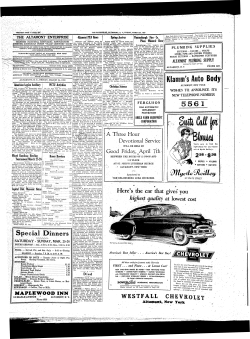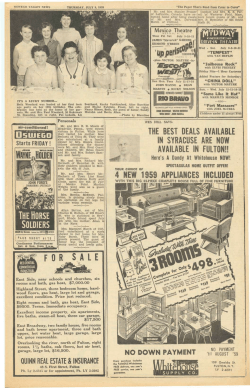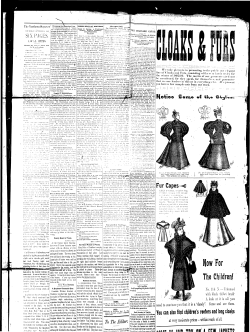
Caring for the Client with Heart Failure Peak Development for ...
Peak Development for ... Home Health Aides© Sample Issue Caring for the Client with Heart Failure Peak Development Resources, LLC P.O. Box 13267 Richmond, VA 23225 Phone: (804) 233-3707 Fax: (804) 233-3705 Peak Development for… Home Health Aides© and Competency Assessment Tool for Home Health Aides© are components of a site license for the Peak Development Resources Competency Assessment System for Home Health Aides© and may be reproduced for this individual facility only. Sharing of these components with any other freestanding facility within or outside the licensee’s corporate entity is expressly prohibited. The information contained in Peak Development for… Home Health Aides is intended only as a guide for the practice of home health aides supervised by licensed personnel. It is the responsibility of the reader to understand and adhere to policies and procedures set forth by the employing institution. The editor and publisher of this newsletter disclaim any liability resulting from use or misuse of information contained herein. Professional guidance from licensed personnel should be sought. Copyright 2007 After reading the newsletter, the home health aide should be able to: 1. Define heart failure. 2. List three signs of heart failure and the reasons they occur. 3. Discuss observations and actions appropriate for care of the client with heart failure. Shelly, the home health aide, is caring for Mr. Adams, who has heart failure. One day, Shelly noticed that Mr. Adams was not eating normally—he told her he just didn't feel hungry. When she checked his pulse, it was 52/min. Shelly knew that Mr. Adams could be having a serious problem, and notified the nurse right away. Mr. Adams was hospitalized later that day. Shelly's sharp observations and knowledge of heart failure helped to save Mr. Adams' life. What is Heart Failure? The heart is a muscular organ that serves as the body’s pump. It must pump blood to the lungs so that the blood can pick up oxygen. It must then pump that oxygen-rich blood through the rest of the body. This is the process of circulation. To pump blood well, the heart must beat in a strong and regular way. Why is circulation important? Because every cell in the body needs oxygen to function. Cells also need nutrients like sugar, fat and protein. Blood pumped by the heart carries oxygen and nutrients to all parts of the body, so the cells stay healthy. Circulating blood also carries away the waste products from cells, so they can be eliminated from the body by organs such as the kidneys. Heart failure, also called congestive heart failure (CHF) is a condition in which the heart's pumping action becomes weak. This can happen as a result of a heart attack (MI), high blood pressure, or a problem with the heart valves. When the heart is not able to pump effectively, blood does not circulate well through the body. Major organs can be damaged by this lack of circulation, such as the brain, kidneys, and even the heart itself. The body's cells don't get the normal amount of oxygen and nutrients needed to function. Also, fluids and waste products build up in the body, since they are not being effectively removed. Signs of Heart Failure Heart failure affects your client's whole body, both physically and mentally. Some of the common signs and symptoms of CHF include: • Shortness of breath (SOB): This often occurs when the client moves around (SOB on exertion). Movement and activity require energy, supplied by oxygen and nutrients. Due to poor circulation, the cells quickly use up the available oxygen during activity, then call out for more. The client's respirations increase in an attempt to meet this need for extra oxygen. SOB on exertion is often the first sign that the client's condition is becoming worse. • • • • • Swelling (edema): This may be seen in the legs and feet of clients who can sit and walk. Look for it on the sacral area of clients who stay in bed. Swelling occurs because the kidneys do not receive adequate blood flow. Therefore, they do not eliminate fluid from the body as well as they normally do, causing build-up of fluid. Also, remember that fluid weighs a lot… the client's weight will increase as swelling continues. Decreased urine output: With poor circulation, the kidneys do not eliminate fluid from the body normally. This causes decreased urine output. Changes in pulse: The pulse may feel weak, rapid, and/or irregular, due to the ineffective pumping action of the heart. Fatigue: Clients with CHF are often very tired. This results from the lack of oxygen and nutrients to the body's cells. Without oxygen and nutrients, the cells cannot produce their normal energy. Fluid in the lungs (pulmonary edema): The combination of poor circulation and excess body fluid may cause fluid to seep into the lungs. This results in SOB, cough, lung congestion, and pink, frothy sputum. Care of the Client Your care of the client with CHF involves watching for worsening condition, helping to prevent complications, assisting the client to manage his energy, and promoting good nutrition. • Watch the client's condition: CHF can develop or worsen very quickly. As you work with your client, take note of her abilities and energy level. This will allow you to quickly notice any changes in her condition. For example, yesterday you noticed that your client could walk from the bed to the chair with only a little SOB. Today, however, you see that the client has severe SOB with that same activity… an excellent observation. Remember that SOB with exertion is often the first sign of worsening condition. Also watch for a decrease in urine output, increased swelling, lung congestion, cough, or fatigue. Any of these signs should be reported to the nurse immediately. • Clients with CHF may suffer problems due to the medications they take to strengthen their heart and remove excess fluid. If your adult client has loss of appetite, nausea, a pulse rate below 60/ min, muscle weakness, or leg cramps, notify the nurse right away. To monitor the client's fluid balance, you may be asked to keep accurate intake and output records, and to weigh the client daily. You may also need to measure her apical-radial pulse, to check the effectiveness of circulation. If your client receives oxygen, follow all safety precautions, such as not allowing smoking or open flames in the area. Don't forget to watch your client's emotional state, as well. Depression is common in clients with CHF, because of their fatigue and decreased activity level. Notify the nurse if your client seems sad, sleeps a lot (or has trouble sleeping) or talks about being "worthless." • Help prevent complications: When a client has poor circulation, blood clots are more likely to form. These can travel to the lungs, brain, or other vital organs and cause serious illness or death. Since these clots often form in the legs, never massage your client's legs. Watch for any sore, warm or reddened areas, and report these to the nurse. When your client is sitting, elevate the legs slightly to improve circulation. • Help to manage the client's energy: Clients with CHF have a limited energy supply. With your help, the client can space out his activities so that he does not become overly tired. Major tasks such as eating, dressing and bathing should be spaced out, with rest periods in between. You may need to allow extra time to do these things, moving at the client's pace. If you see the client becoming short of breath or tired, stop the activity and give the client time to rest. Assistive devices, such as a bedside commode, may be helpful. • Promote good nutrition: The client with CHF may be on a diet with reduced fat and sodium. You can improve the taste of this diet by adding seasonings such as lemon juice, pepper, or spices. Foods high in fiber, such as fruits, vegetables, oatmeal and whole wheat bread, are important to prevent constipation. Clients with heart disease should avoid constipation, since straining to have a bowel movement may cause additional heart problems. Heart failure is a serious disorder that has great impact on your client's quality of life. Your good care can help the client to live a more comfortable and satisfying life. Peak Development for… Home Health Aides Caring for the Client with Heart Failure Page 2 Peak Development for ... Home Health Aides© Monthly Staff Development Resource Sample Issue Caring for the Client with Heart Failure Learning Objectives: After reading the newsletter, the home health aide should be able to: 1. Define heart failure. 2. List three signs of heart failure and the reasons they occur. 3. Discuss observations and actions appropriate for care of the client with heart failure. Suggested Adjunct Activities: 1. During a team conference, present a case study of a client with heart failure. Have the home health aides discuss ways to meet this client's needs. 2. Review documentation of home health aides assigned to clients with heart failure. Is there evidence of appropriate actions to manage the client's energy, promote good nutrition and observe for signs of worsening condition? Competency Assessment Tool Answer Key: 1. A. 2. D. 3. B. 4. B. 5. A. 6. D. 7. A. 8. B. 9. C. 10. C. True all of the above SOB on exertion feet "I've only urinated once today—I usually go more than that." thick, yellow sputum True check for sore or red areas and report to the nurse 10:30 am reduced sodium Peak Development for ... Home Health Aides© Competency Assessment Tool Sample Issue Caring for the Client with Heart Failure NAME: DATE: Directions: Place the letter of the one best answer in the space provided. Mrs. Johnson, age 63, has heart failure. _____1. In heart failure, the heart's pumping action becomes weak, resulting in lack of oxygen and nutrients to the body's cells. A. True B. False _____2. Heart failure may be caused by which of the following? A. heart attack B. problem with a heart valve C. high blood pressure D. all of the above _____3. The earliest sign that Mrs. Johnson's condition is getting worse is most likely: A. a cough B. SOB on exertion C. decreased pulse rate D. weight gain _____4. Mrs. Johnson is able to walk around for short periods and sit in a chair. Her swelling is most likely to occur in what body part? A. sacrum B. feet C. arms D. face _____5. Mrs. Johnson makes all of the following remarks. Which one most likely indicates that her condition is becoming worse? A. "I've only urinated once today—I usually go more than that." B. "Could you get me some cookies—I'm really hungry today." C. "I slept very soundly last night." D. "I lost one pound last week." _____6. Mrs. Johnson is at risk for pulmonary edema (fluid in the lungs). Signs of this include all of the following EXCEPT: A. cough B. lung congestion C. shortness of breath D. thick, yellow sputum _____7. Actions such as monitoring daily weights and recording intake and output help to identify changes in the client's fluid balance. A. True B. False _____8. Mrs. Johnson complains of discomfort in her right leg. The HHA’s best response is to: A. tell Mrs. Johnson that this is a common problem with heart failure B. check for sore or red areas and report to the nurse C. rub Mrs. Johnson's legs to relieve the discomfort D. ask Mrs. Johnson if she needs to take another heart pill _____9. Mrs. Johnson eats breakfast at 8:30 am and lunch at 12:30 pm. To help Mrs. Johnson manage her energy, the best time to help her bathe and dress is: A. 8:00 am B. 9:00 am C. 10:30 am D. 12:00 noon _____10. Which of the following diets is most likely to be ordered for clients with heart failure? A. low fiber B. high fat C. reduced sodium D. all of the above Competency Assessment Tool Caring for the Client with Heart Failure
© Copyright 2025









